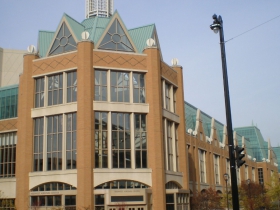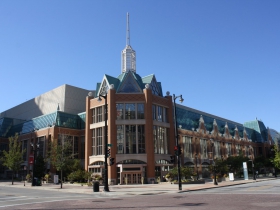Convention Center District Authorizes $420 Million Expansion, Raises Hotel Tax
District still aiming for 2023 opening even though bonds can't be sold.
The Wisconsin Center District (WCD) board authorized a $419.9 million expansion of Milwaukee’s convention center Thursday morning alongside raising the county hotel tax from 2.5 to 3 percent, extending the food and beverage sales tax past its 2033 expiration and authorizing refinancing up to $150 million in debt.
The 17-member board, participating via the phone, spent over an hour debating the merits of authorizing the expansion amidst an unprecedented global shutdown and the potential the district could default on its existing debt. A total of 61 events have been canceled or postponed at the Wisconsin Center, Miller High Life Theatre and UW-Milwaukee Panther Arena.
The expansion plans call for adding 112,000 square feet of space to the exhibition hall, creating a 300,000-square-foot hall. A ballroom would be included in the expansion with a minimum of 30,000 square feet of space and a seating capacity of at least 2,000. A total of 24 meeting rooms would be added to the building.
With these changes the building could host two major conventions at the same time.
But the deal isn’t done, even with the authorization. Because of turbulence in the bond markets, the board’s Governance Committee will still need to vote to allow project consultants to sell the bonds at a future date. “These are certainly challenging times for everyone and that includes the bond market,” said project consultant John Mehan of Robert W. Baird & Co.
“Until we get into a recovery mode and those spigots have been turned back on, we know we can’t be issuing bonds because the resources aren’t there to cover debt service payments,” said WCD CEO Marty Brooks after the meeting. “Assuming the bond market improves within this year, we still believe there will be groundbreaking within calendar year 2021.”
Without any action, the district expects to default on its existing debt in December. Refinancing up to $150 million in debt would create the financial capacity to avoid default. “The need to have the debt restructured became more acute in the last 60 days than it had in the last several years,” said the CEO. Up to $15 million in new debt could also be issued under the plan to support capital projects that would ordinarily be funded by revenue from events.
Brooks is expecting a rebound this year. “We do see a very active third and fourth quarter,” said Brooks. The Democratic National Convention is still expected to occur and was pushed back from July to the week of August 17th during the meeting. It would provide the district with at least $2 million in revenue.
“The discussion of the expansion has always been on the table. It never seems to be the right time to pull the trigger to make these plans happen,” said Common Council president Ashanti Hamilton shortly before voting on the deal. Hamilton said last week he would vote against the deal, but has spent the past week negotiating with Brooks over a revenue-sharing agreement with the city. “Right now I think it’s very important for us to put forward to the public some sense of hope.”
“[The expansion] will be part of the inevitable recovery when we are done with the here and now,” said Department of Administration Secretary Joel Brennan.
Four board members ultimately voted against the expansion. Alderman Robert Bauman, Senate Majority Leader Scott Fitzgerald, Milwaukee County Comptroller Scott Manske and Representative Joe Sanfelippo.
“The forecast and horizon are disturbing and causing us to really contemplate how much general-purpose revenue is available to the state,” said Fitzgerald of the state’s looming fiscal challenges. He said with those concerns he couldn’t endorse the new debt.
Bauman and Sanfelippo raised concerns with future projections and the move to give authority to the Governance Committee. “My simple point is in another three to four weeks, the predictions may very well diminish more,” said Bauman.
But the board ultimately passed the expansion, tax increase and extension and refinancing plan on a 12-4-1 vote. Alderwoman Milele A. Coggs, who represents the area north of the convention center, abstained without explanation, but said she hopes the WCD makes a real effort to engage nearby residents in constructing the building.
The district is raising the countywide hotel tax by a half percent to expand its debt reserve fund. A move to delay this increase until the project debt was sold was rejected by the board.
Beyond the bond market, a complicated piece of the deal remains. The City of Milwaukee also needs to approve a revenue-sharing agreement.
Negotiations between Hamilton, Mayor Tom Barrett‘s office and Brooks have progressed since the proposal was first announced over the weekend. The city would now get payments in $1 million increments based on district revenue, up from $750,000, starting in 2025. It would also receive fixed cash payments of $250,000 in May 2022, $500,000 in May 2023 and $750,000 in May 2024.
Bauman, who warned his colleagues had yet to review and approve the deal, parted ways with the Republican legislators over approving the district’s side of the revenue-sharing agreement with the City of Milwaukee. Fitzgerald and Sanfelippo voted against that proposal, with the latter calling it a “shakedown” by the city.
The state’s approval of a $300 million moral obligation (to pay off the loans in a default) for the district required the city to sign off on the support and the city, in a move championed by Bauman, has held that support after initially granting it. Without the moral obligation project borrowing costs could increase by up to $50 million according to a consultant report.
The Common Council will review the agreement at its next meeting.
For more on the Wisconsin Center District and its proposal see our earlier coverage on the financial challenges, building design or financing details.
Renderings
Current Building
If you think stories like this are important, become a member of Urban Milwaukee and help support real, independent journalism. Plus you get some cool added benefits.
More about the Wisconsin Center expansion
- Council Could Kill Revised Baird Center Revenue-Sharing Agreement - Jeramey Jannene - May 21st, 2025
- $456 Million Baird Center Opens With Big Promises, Vision - Jeramey Jannene - May 16th, 2024
- Public Can Tour Baird Center Expansion - Jeramey Jannene - May 7th, 2024
- See Inside The Massive Baird Center Expansion - Jeramey Jannene - Apr 18th, 2024
- Baird Center Selects Artists, Works To Be Displayed - Sophie Bolich - Jan 22nd, 2024
- City Hall: Council Wants New Deal, Says Convention Center ‘Outsmarted’ City - Jeramey Jannene - Oct 16th, 2023
- ‘Polka Time!’ Escalator Gets Celebratory Sendoff - Sophie Bolich - Aug 18th, 2023
- Eyes on Milwaukee: Baird Center Reaches Highest Point - Jeramey Jannene - May 11th, 2023
- Wisconsin Center Makes Deal to Save Literary Artwork - Bruce Murphy - May 1st, 2023
- Wisconsin Center Pauses Art Removal - Jeramey Jannene - Apr 14th, 2023
Read more about Wisconsin Center expansion here
Political Contributions Tracker
Displaying political contributions between people mentioned in this story. Learn more.
- June 21, 2017 - Tom Barrett received $400 from Joel Brennan
- March 21, 2016 - Tom Barrett received $400 from Joel Brennan
- December 21, 2015 - Tom Barrett received $400 from Joel Brennan
Eyes on Milwaukee
-
Church, Cupid Partner On Affordable Housing
 Dec 4th, 2023 by Jeramey Jannene
Dec 4th, 2023 by Jeramey Jannene
-
Downtown Building Sells For Nearly Twice Its Assessed Value
 Nov 12th, 2023 by Jeramey Jannene
Nov 12th, 2023 by Jeramey Jannene
-
Immigration Office Moving To 310W Building
 Oct 25th, 2023 by Jeramey Jannene
Oct 25th, 2023 by Jeramey Jannene






























